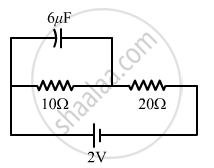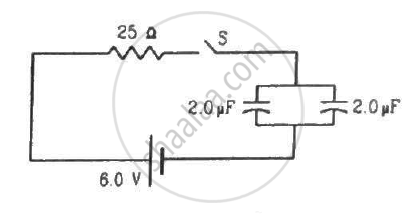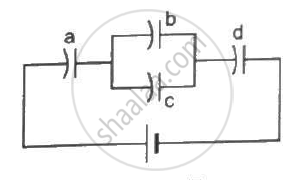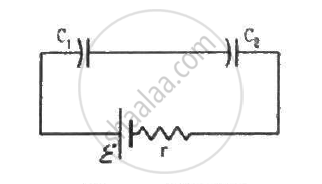Advertisements
Advertisements
प्रश्न
How many time constants will elapse before the charge on a capacitors falls to 0.1% of its maximum value in a discharging RC circuit?
उत्तर
The decay of charge across a capacitor,
\[q = Q e^{- \frac{t}{RC}}\]
Here, q = 0.1 % and Q = 1 × 10−3 Q
⇒ 1 × 10−3 Q = \[Q e^{- \frac{t}{RC}}\]
\[\Rightarrow e^{- \frac{t}{RC}}=10^{-3}\]
\[\Rightarrow \frac{t}{rC} = - \left( - 6 . 9 \right) = 6 . 9\]
Let t = nRC
\[\Rightarrow \frac{nRC}{RC} = 6 . 9\]
\[ \Rightarrow n = 6 . 9\]
APPEARS IN
संबंधित प्रश्न
Find the charge on the capacitor as shown in the circuit.

Find the ratio of energy stored in the two configurations if they are both connected to the same source.
A capacitor of capacitance 500 μF is connected to a battery through a 10 kΩ resistor. The charge stored in the capacitor in the first 5 s is larger than the charge stored in the next.
(a) 5 s
(b) 50 s
(c) 500 s
(d) 500 s
A capacitor C1 of capacitance 1 μF and a capacitor C2 of capacitance 2 μF are separately charged by a common battery for a long time. The two capacitors are then separately discharged through equal resistors. Both the discharge circuits are connected at t = 0.
(a) The current in each of the two discharging circuits is zero at t = 0.
(b) The currents in the two discharging circuits at t = 0 are equal but not zero.
(c) The currents in the two discharging circuits at t = 0 are unequal.
(d) C1 loses 50% of its initial charge sooner than C2 loses 50% of its initial charge.
How many time constants will elapse before the energy stored in the capacitor reaches half of its equilibrium value in a charging RC circuit?
Two capacitors of capacitances 4⋅0 µF and 6⋅0 µF are connected in series with a battery of 20 V. Find the energy supplied by the battery.
By evaluating ∫i2Rdt, show that when a capacitor is charged by connecting it to a battery through a resistor, the energy dissipated as heat equals the energy stored in the capacitor.
Find the charge on each of the capacitors 0.20 ms after the switch S is closed in the figure.

Each capacitor in figure has a capacitance of 10 µF. The emf of the battery is 100 V. Find the energy stored in each of the four capacitors.

A capacitor of capacitance 100 μF is connected across a battery of emf 6 V through a resistance of 20 kΩ for 4 s. The battery is then replaced by a thick wire. What will be the charge on the capacitor 4 s after the battery is disconnected?
Consider the situation shown in figure. The switch is closed at t = 0 when the capacitors are uncharged. Find the charge on the capacitor C1 as a function of time t.

Choose the correct option:
Energy stored in a capacitor and dissipated during charging a capacitor bear a ratio.
A capacitor is a device that stores ____________.
A parallel plate condenser is immersed in an oil of dielectric constant 2. The field between the plates is ______.
A parallel plate capacitor has a uniform electric field `overset(->)("E")` in the space between the plates. If the distance between the plates is ‘d’ and the area of each plate is ‘A’, the energy stored in the capacitor is ______
(ε0 = permittivity of free space)
A fully charged capacitor C with initial charge q0 is connected to a coil of self-inductance L at t = 0. The time at which the energy is stored equally between the electric and magnetic fields is ______.
Electrostatic energy of 4 x 10−4 J is stored in a charged 25 pF capacitor. Find the charge on the capacitor.
Derive an expression for energy stored in a capacitor.
